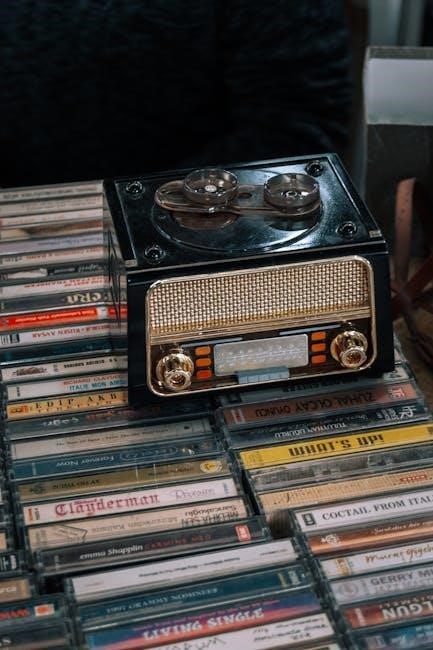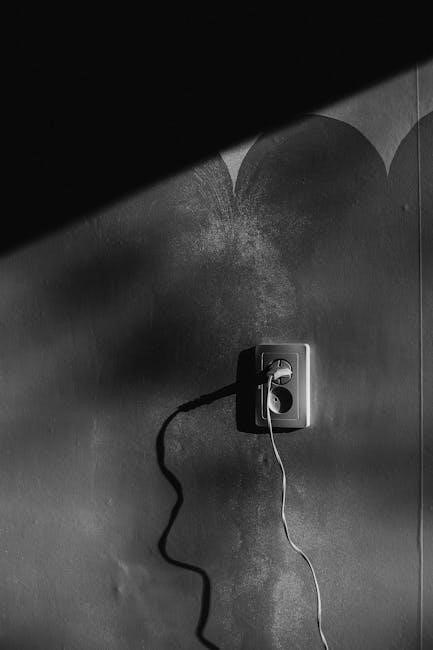Hookup culture refers to a cultural phenomenon involving casual sexual encounters, often devoid of emotional commitment, prevalent in higher education settings, impacting relationships and mental health, as explored in studies like Freitas’ 2013 work.
1.1 Definition and Scope of Hookup Culture
Hookup culture is defined as a social phenomenon characterized by casual sexual encounters between individuals without expectations of long-term commitment or emotional involvement. It is predominantly observed in higher education settings, where it has become a normative aspect of student life, influencing relationships, sexual behavior, and mental health. The scope of hookup culture extends beyond physical interactions, encompassing societal attitudes, media representation, and psychological factors that shape its prevalence and acceptance in modern society.
1.2 Relevance of Hookup Culture in Modern Society
Hookup culture significantly influences modern societal dynamics, shaping attitudes toward sex, relationships, and intimacy. It reflects evolving norms about casual encounters and emotional detachment, impacting mental health and relationship expectations. The prevalence of hookup culture is reinforced by media, social media, and psychological factors, making it a critical area of study to understand contemporary sexual behavior and its broader societal implications.

Historical Context of Hookup Culture
Hookup culture emerged prominently in higher education, evolving from earlier sexual norms and influenced by shifting societal values, media, and psychological factors over time.
2.1 Emergence of Hookup Culture in Higher Education
Hookup culture gained prominence in colleges and universities, evolving from shifting sexual norms and societal influences. Casual encounters replaced traditional dating, with media and psychological factors fueling its rise. Higher education settings became breeding grounds for uncommitted relationships, reflecting broader cultural changes and generational attitudes toward intimacy and commitment.
2.2 Evolution of Hookup Culture Over Time
Hookup culture has evolved significantly, influenced by changing social norms and technological advancements. The rise of dating apps and social media accelerated casual encounters, shifting from taboo to normalized behavior. Over time, it adapted to cultural shifts, becoming more prevalent and socially accepted, while also sparking debates about its impact on relationships and sexual health.

Psychological and Sociological Aspects
Hookup culture is shaped by psychological factors like self-concept discrepancies and societal influences, including individualism and technology, impacting sexual behavior and relationship dynamics among individuals.
3.1 Psychological Factors Driving Hookup Behavior
Psychological factors such as self-concept discrepancies and the desire for validation often drive hookup behavior. Studies suggest that individuals with lower self-esteem or identity confusion may engage in casual encounters to seek external validation. Additionally, the normalization of hookups in popular culture can create a sense of social pressure, leading individuals to participate despite potential emotional or mental health consequences.
3.2 Societal Influences on Hookup Culture
Societal influences, such as the normalization of casual sex in media and film, have significantly shaped hookup culture. The rise of dating apps and social media has further facilitated casual encounters, creating a culture where uncommitted relationships are expected and often encouraged. Additionally, shifting societal norms toward individualism and the decline of traditional relationship values contribute to the prevalence of hookup culture, emphasizing personal freedom over emotional connection.
Hookup Culture in Popular Media
Popular media, including music and film, often glorifies casual encounters, normalizing hookup culture and influencing societal attitudes toward uncommitted relationships and sexual behaviors among younger audiences.
4.1 Representation of Hookup Culture in Music and Film
Music and film frequently portray hookup culture as a normative and desirable lifestyle, with lyrics and storylines often glorifying casual encounters. Movies like Animal House and Friends with Benefits exemplify this trend, while songs by artists like Drake and Taylor Swift reference fleeting relationships. These depictions normalize non-committal interactions, shaping societal attitudes and reinforcing the idea that casual sex is a natural part of modern life, particularly among younger audiences.
4.2 Role of Social Media in Shaping Hookup Norms
Social media platforms like Tinder and Instagram have significantly influenced hookup culture by creating spaces for casual connections. Algorithms promote hookups through features like “swipes” and location-based matches, fostering a culture of instant gratification. Users often curate profiles highlighting physical appeal, reinforcing superficial interactions. This digital environment normalizes short-term relationships, making hookups appear effortless and socially acceptable, thereby reshaping traditional dating norms and expectations among younger generations.

Impact on Relationships and Sexual Behavior
Hookup culture often leads to emotional detachment and reduced intimacy in relationships, while sexual satisfaction varies, with some experiencing liberation and others feeling unfulfilled or disconnected emotionally.
5.1 Effects of Hookup Culture on Long-Term Relationships
Hookup culture can complicate the development of long-term relationships by fostering emotional detachment and prioritizing casual encounters. This may lead to difficulty in forming meaningful connections, as individuals become accustomed to fleeting interactions rather than investing in emotional intimacy. Consequently, some struggle to transition from casual hookups to committed partnerships, potentially hindering relationship satisfaction and stability over time.
5.2 Hookup Culture and Sexual Satisfaction
Hookup culture often prioritizes physical gratification over emotional connection, which can lead to varied levels of sexual satisfaction. While some individuals report positive experiences, others express dissatisfaction due to the lack of intimacy and communication. Studies, such as Freitas’ 2013 work, suggest that casual encounters may leave participants feeling unfulfilled, highlighting a disconnect between physical acts and emotional needs in hookup dynamics.
Gender Differences in Perceptions of Hookup Culture
Gender differences in perceptions of hookup culture reveal varied attitudes, with men often expressing more positive views, while women may experience societal pressure or dissatisfaction, studies suggest.
6;1 Male and Female Perspectives on Hookups
Men often view hookups as casual, enjoyable experiences, aligning with traditional narratives of masculinity. In contrast, women may perceive hookups as lacking emotional fulfillment, reflecting societal expectations of relational engagement. These differing perspectives highlight gendered norms influencing attitudes toward casual encounters, as studies like Freitas’ 2013 work suggest.
6.2 Gender Roles in Hookup Culture Dynamics
Traditional gender roles significantly influence hookup dynamics, with men often expected to initiate encounters and prioritize quantity, while women face societal judgment for their participation. Emotional investment differs, as women may seek connection, whereas men often emphasize casualness. These norms perpetuate inequalities, shaping experiences and perceptions within hookup culture, as highlighted in studies examining gendered behaviors and societal expectations.
Risks and Downsides of Hookup Culture
Hookup culture poses risks, including emotional dissatisfaction, mental health concerns, and physical risks like STIs. Casual encounters often lack intimacy, leading to feelings of emptiness and disconnection, as noted in studies like Freitas’ 2013 work on sexual unfulfillment.
7.1 Emotional and Mental Health Consequences
Engaging in hookup culture can lead to emotional dissatisfaction, anxiety, and depression. Many individuals report feelings of emptiness and disconnection after casual encounters. The lack of emotional intimacy in these interactions often results in unmet relational needs. Additionally, the pressure to conform to societal expectations of hookups can create internal conflict, potentially contributing to mental health challenges and a sense of identity crisis for some participants.
7.2 Physical Risks Associated with Casual Encounters
Casual encounters often involve unprotected sex, increasing the risk of sexually transmitted infections (STIs) like chlamydia, gonorrhea, and HIV. Unintended pregnancies are another potential consequence. Additionally, the rise of dating apps has amplified exposure to such risks, as individuals may engage in spontaneous sexual activities without proper precautions or prior health discussions, further elevating physical health vulnerabilities in hookup culture.
Navigating Hookup Culture Responsibly
Navigating hookup culture responsibly involves clear communication, setting boundaries, and prioritizing consent. Using protection and understanding expectations help maintain emotional and physical well-being.
8.1 Strategies for Healthy Engagement in Hookup Culture
Engaging healthily in hookup culture involves open communication about expectations, ensuring consent, and respecting boundaries. Prioritizing self-awareness, emotional preparedness, and safe practices fosters a positive experience. Understanding personal limits and maintaining mutual respect are key to navigating casual encounters without compromising emotional or physical well-being.
8.2 Setting Boundaries and Communicating Expectations
Establishing clear boundaries and openly discussing expectations are crucial for healthy engagement in hookup culture. Communicating desires, limits, and intentions ensures mutual respect and understanding. Prioritizing consent and emotional well-being helps prevent misunderstandings. Setting boundaries fosters a respectful and considerate environment, allowing individuals to navigate casual encounters with confidence and clarity.

Future of Hookup Culture
Hookup culture may evolve with shifting societal norms, integrating intimacy and casual encounters more mindfully. Technology and changing values will likely reshape its dynamics and acceptance.
9.1 Predictions for Hookup Culture in a Changing World
Hookup culture may evolve with technological advancements, fostering more virtual encounters. Societal shifts toward acceptance of casual sex could normalize hookups further, though mental health concerns might prompt a reevaluation of intimacy norms.
9.2 Potential Shifts in Societal Attitudes Toward Hookups
Societal attitudes may shift toward a more balanced view of hookups, embracing casual encounters while prioritizing emotional intimacy. As mental health concerns rise, there could be a pushback against hookup culture, fostering a redefinition of intimacy and relationships that emphasize deeper connections alongside physical encounters.
Hookup culture is prevalent yet complex, reflecting societal shifts in intimacy and relationships. While it offers freedom, studies highlight emotional dissatisfaction and mental health concerns, urging deeper understanding of its implications.
10.1 Summary of Key Findings
Hookup culture represents a significant shift in modern intimacy, characterized by casual encounters and evolving societal norms. Studies reveal both liberation and dissatisfaction, emphasizing psychological impacts and gender dynamics. Media normalization and technological influences play crucial roles, while concerns about mental health and emotional well-being persist. Understanding these complexities is essential for navigating the cultural landscape responsibly and fostering healthier engagement with hookup practices in contemporary society.
10.2 Final Thoughts on the Significance of Hookup Culture
Hookup culture reflects a profound cultural shift in intimacy, blending liberation with dissatisfaction. While it offers sexual freedom, it often leaves individuals emotionally unfulfilled. Media and technology amplify its reach, while gender roles and mental health concerns highlight its complexities. Open dialogue and education are crucial for fostering healthier attitudes toward intimacy, ensuring hookup culture evolves to prioritize both pleasure and emotional well-being in a rapidly changing world.

Leave a Reply